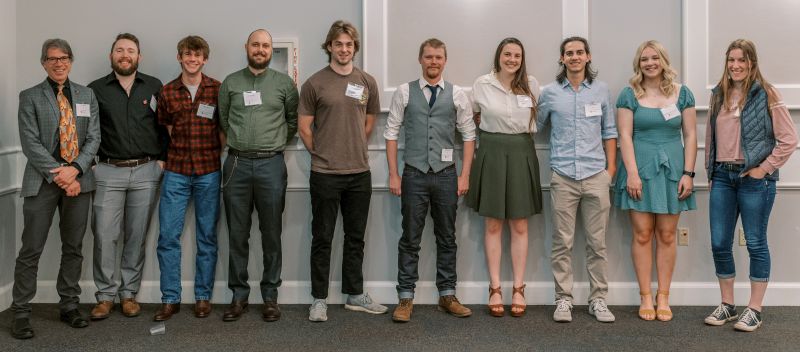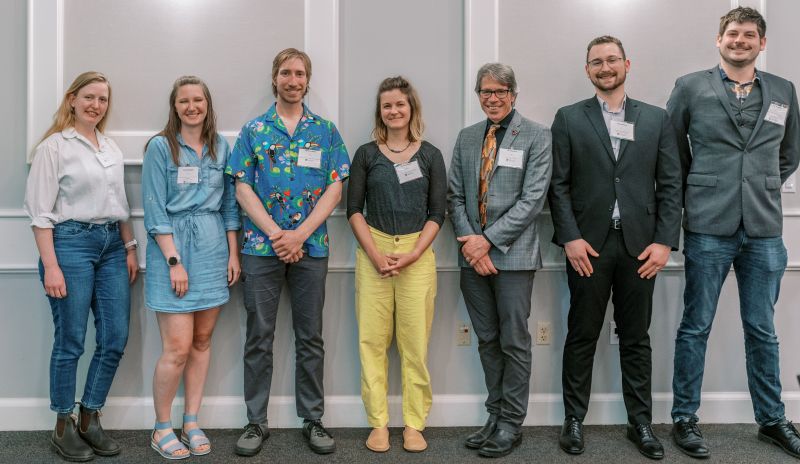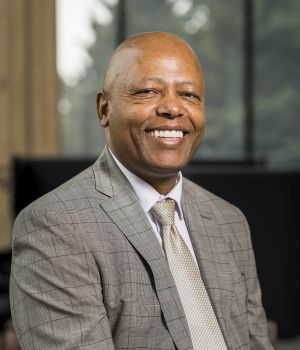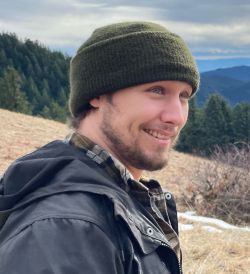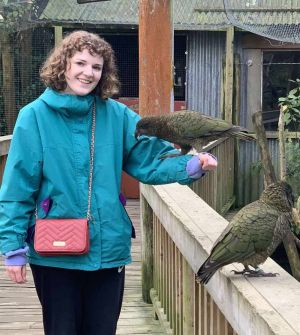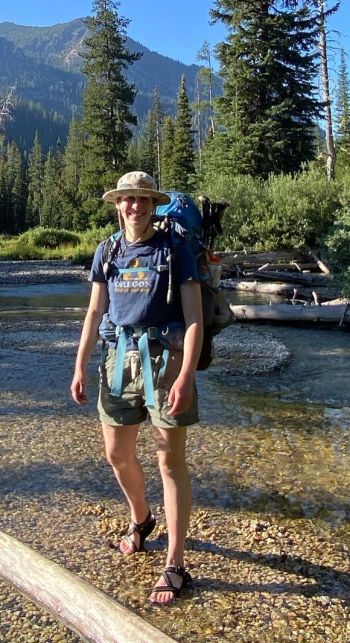This year’s Dean’s Dinner was a celebration of our scholarship recipients, outstanding alumni, donors, and college community.

Dean Tom DeLuca started the formal awards ceremony by recognizing professor emeritus Darius Adams for being the recipient of the 2023 International Marcus Wallenberg Prize. He shares the award with Joseph Buongiorno, Professor Emeritus of Forest Economics at the University of Wisconsin-Madison, and Richard W. Haynes, the US Forest Service Pacific Northwest Research Station in Portland, OR. They were recognized for their work on the original and groundbreaking forest economic models, the Timber Assessment Market Model (TAMM) and PAPYRUS, a spatial equilibrium model of the North American pulp and paper industry. Both models extend to the widely used Global Forest Products Model (GFPM). Dick Waring was the recipient of this significant honor in 2020 and we recognized him here last year (after two postponements due to COVID). It’s rare to have a professor from a college recognized once, let alone twice in three years, yet that’s what’s happened within our incredible College of Forestry community!

Randy Rosenberger introduced Dr. Suzanne Simard, Forest Ecosystem’s & Society’s Outstanding Alumni awardee. Suzanne is a Professor of Forest Ecology at the University of British Columbia and the author of the book, “Finding the Mother Tree.” She is a pioneer on the frontier of plant communication and intelligence. Her work has influenced filmmakers (the Tree of Souls in James Cameron’s Avatar) and her TED talks have been viewed by more than 10 million people worldwide. Suzanne is known for her work on how trees interact and communicate using below-ground fungal networks, which has led to the recognition that forests have hub trees, or Mother Trees, which are large, highly connected trees that play an important role in the flow of information and resources in a forest. Suzanne has published over 200 peer-reviewed articles and presented at conferences around the world. In 2023 she received the Kew International Medal.

Jeff Hatten introduced Jessica Leahy, Forest Engineering, Resources & Management Outstanding Alumni awardee. Jessica has been actively engaged in supporting and encouraging women in forestry. She was the second woman tenured in the School of Forest Resources at the University of Maine (UMaine) and the first to achieve the rank of full professor. She has mentored at least seven Ph.D. students to completion, six of whom are women and went on to academic positions. She was a founding member of SWIFT in 2016, a group created at UMaine to support women and gender minorities in forestry educational programs, and was an advisory council member for the inaugural Women’s Forest Congress in 2022. She has authored over 50 papers with over 2000 citations in social sciences in forestry. She recently served as the Associate Dean for the College of Natural Sciences, Forestry and Agriculture and as the Associate Director of the Maine Agricultural and Forest Experiment Station at UMaine. In addition, she is a highly involved member of the professional forestry and landowning community including the Society of American Foresters and the Maine Woodlands Owners landowner advocacy group. A forest landowner herself, she and her husband were recognized as Maine’s Outstanding Tree Farmers of the Year in 2020.
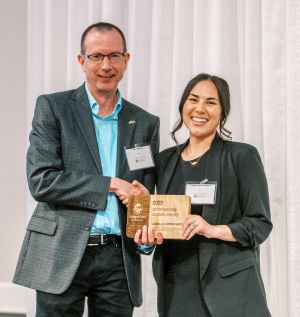
Eric Hansen introduced Camille Chow-Moyers, Wood Science’s Outstanding Alumni awardee. Camille received her B.S. in Renewable Materials and Interior Design from Oregon State University in 2014. She went on to work for Roseburg Forest Products in Quality Assurance and Sales, before a 6-year stint working as a Program Manager of International Compliance and Auditing for Benchmark International (Eugene, OR and Shanghai, China). Today, she is co-owner of MCM Global, LLC (Portland, OR and Yorkshire, England), a consulting and auditing firm that specializes in international forestry compliance and quality management systems.
Amy Riley, Director of Student Success, acknowledged the work of the student clubs and organizations – Xi Sigma Pi, SAF Student Chapter, Forest Utilization Society, the Forestry Club, the Natural Resources Club, and the International Forestry Students Association. The College of Forestry Ambassadors help us recruit prospective students, represent college academic programs to legislators and key stakeholders, work with alumni groups, and represent the College at many on and off campus events. Amy recognized them for their service to the College, which is in addition to their outstanding academic performances, involvement in extracurricular activities, family responsibilities, jobs, and community connections. Lastly, she recognized the OSU Forestry Club for hosting, and winning, the 83rd Annual Western Forestry Conclave Logging Sports Event in April. Conclave is an annual logging sports event held at different colleges throughout the northwest, was last hosted by Oregon State University in 2012.
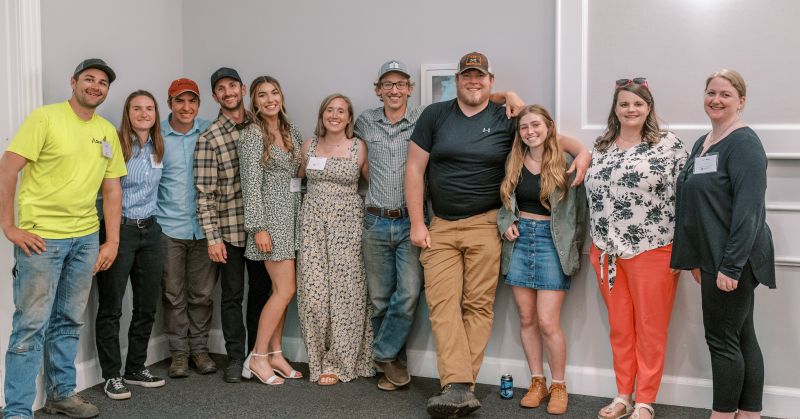
Jacob Atkins, a graduate student in Wood Science, recognized outstanding faculty for their excellence in teaching and excellence in mentoring. The Xi Sigma Pi “Julie Kliewer” Excellence in Mentoring Award went to Mindy Crandall, Forest Engineering, Resources, and Management. The Aufderheide Excellence in Teaching Award went to Jim Kiser, Forest Engineering, Resources, and Management and Kevin Bladon, Forest Engineering, Resources, and Management.
The winner of the Pack Essay Award is Burke DeBoer, a natural resource student. Their essay was titled “Fungi and the Future of Farming.” The Photo of the Year award went to Adam Smith, a pre-forest engineering student, for his photo titled “Monsoon Plains Sunset.” Each year the College of Forestry is honored and privileged to award graduate fellowships and undergraduate scholarships to deserving new and returning students. These awards are made possible through the generous contributions and continued support from our scholarship and fellowship donors. The College of Forestry’s Scholarship Committee reviewed 393 applications for undergraduate scholarships, and 145 students were selected to receive scholarships totaling $664,050 for the 2023-2024 academic year. College of Forestry fellowships recognize our top incoming and returning graduate students as well, nominated by their degree program. The Graduate Scholarship committee selected 28 students, both Master- and PhD- level, to receive college fellowships totaling just over $150,000 for the 2023-2024 academic year. All students who were able to attend came up in small groups for congratulations with the Dean, pictured below.
